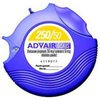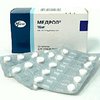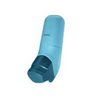| Package | Per Pill | Price | Savings | Bonus | Order |
|---|---|---|---|---|---|
| 500mcg × 1 inhalers | $100.32 | $100.32 | + Viagra |
| Package | Per Pill | Price | Savings | Bonus | Order |
|---|---|---|---|---|---|
| 250mcg × 1 inhalers | $89.28 | $89.28 | + Ed trial pack 1 |
INDICATIONS
Advair Diskus is used for long-term treatment of asthma and chronic obstructive pulmonary disease (COPD) in certain patients. It may also be used to treat other breathing conditions as determined by your doctor. Advair Diskus is a long-acting corticosteroid and bronchodilator combination. It works by reducing inflammation and widening the airways in the lungs, which helps you breath more easily.
INSTRUCTIONS
Use Advair Diskus as directed by your doctor.
- Do not use a spacer with Advair Diskus.
- Always ready and use this device in a level, flat position.
- Hold the device in one hand and put the thumb of your other hand on the thumb grip. Push your thumb away from you as far as it will go until the mouthpiece appears and snaps into position.
- Hold the device in a level, flat position with the mouthpiece toward you. Slide the lever away from you as far as it will go until it clicks.
- Do NOT close or tilt the device, play with the lever, or move the lever more than 1 time. This may release or waste extra doses.
- Hold the device away from your mouth and breathe out fully. Do NOT breathe into the inhaler. Put the mouthpiece to your lips. Breathe in quickly and deeply through the device.
- Remove the device from your mouth. Hold your breath for about 10 seconds, or as long as is comfortable. Then breathe out slowly.
- Close the device. Put your thumb on the thumb grip and slide it back toward you as far as it will go. The device will click shut and the lever will return to its original position.
- Your dose of medicine is a very fine powder. Most, but not all, patients can taste or feel the dose. Do NOT use another dose if you do not taste or feel the medicine. If you are not sure if you are receiving your dose, contact your doctor or pharmacist.
- Rinse your mouth with water after using Advair Diskus. DO NOT swallow the rinse solution. Spit the rinse water out.
- If you are using other inhaled medicines, wait a few minutes between using Advair Diskus and other inhalers, unless directed otherwise by your doctor.
- Take your doses of Advair Diskus about 12 hours apart, unless your doctor tells you otherwise.
- Never wash the mouthpiece or any other part of the inhaler. Keep it dry. Store Advair Diskus in a dry place.
- Throw Advair Diskus away 1 month after you remove it from the foil pouch, or after the dose indicator reads "0," whichever comes first.
- You may breathe more easily after the first dose of Advair Diskus. However, it may take 1 week or longer to achieve the most benefit.
- Use Advair Diskus on a regular schedule to get the most benefit from it. Using Advair Diskus at the same time each day will help you remember to use it. Do not stop using Advair Diskus even if you feel better unless your doctor tells you.
- If you miss a dose of Advair Diskus, skip the missed dose and go back to your regular dosing schedule. Do not use 2 doses at once.
Ask your health care provider any question you may have about how to use Advair Diskus.
STORAGE
Store Advair Diskus between 68 and 77 degrees F (20 and 25 degrees C). Store away from heat, moisture, and light. Do not store in the bathroom. Keep Advair Diskus out of the reach of children and away from pets.
MORE INFO:
Active Ingredient: Fluticasone propionate, Salmeterol xinafoate.
Do NOT use Advair Diskus if:
- you are allergic to any ingredient in Advair Diskus or to milk proteins
- you are having an asthma attack (eg, sudden, severe onset or worsening of asthma symptoms such as chest tightness, cough, shortness of breath, wheezing)
- you are using another type of long-acting inhaled bronchodilator (eg, formoterol inhalation powder, salmeterol inhalation powder)
- you are taking an azole antifungal (eg, ketoconazole), certain HIV protease inhibitors (eg, ritonavir), a macrolide antibiotic (eg, clarithromycin), nefazodone, or telithromycin.
Contact your doctor or health care provider right away if any of these apply to you.
Some medical conditions may interact with Advair Diskus. Tell your doctor or pharmacist if you have any medical conditions, especially if any of the following apply to you:
- if you are pregnant, planning to become pregnant, or are breast-feeding
- if you are taking any prescription or nonprescription medicine, herbal preparation, or dietary supplement
- if you have allergies to medicines, foods, or other substances
- if you are taking a monoamine oxidase inhibitor (MAOI) (eg, phenelzine) or tricyclic antidepressant (eg, amitriptyline), or if you have taken either of these medicines within the last 14 days
- if you have high blood acid levels (eg, ketoacidosis) or a history of diabetes, glaucoma, or increased pressure in the eye, heart problems (eg, fast or irregular heartbeat, heart blood vessel problems), high blood pressure, nervous system problems, liver problems, low blood potassium levels, seizures, thyroid problems, or an adrenal gland tumor
- if you are having a COPD flare-up, have recently been to an emergency room for asthma, have a history of frequent hospitalizations for asthma, or have ever had a life-threatening asthma attack
- if you have a fungal, bacterial, or parasitic infection; a viral infection (eg, measles, chickenpox, shingles); herpes virus infection of the eye; tuberculosis (TB); a history of a positive TB skin test; or immune system problems; or if you have had a recent vaccination
- if you have weak bones (osteoporosis) or have risk factors for osteoporosis (eg, a family history of osteoporosis, tobacco use, long-term use of corticosteroids or certain seizure medicines, limited physical exercise, poor nutrition).
Some medicines may interact with Advair Diskus. Tell your health care provider if you are taking any other medicines, especially any of the following:
- Diuretics (eg, hydrochlorothiazide, furosemide) or long-acting inhaled bronchodilators (eg, salmeterol inhalation powder, formoterol inhalation powder) because the risk of low blood potassium or irregular heartbeat may be increased
- Beta-blockers (eg, propranolol) because they may decrease Advair Diskus's effectiveness
- Azole antifungals (eg, ketoconazole), catechol-O-methyltransferase (COMT) inhibitors (eg, entacapone), delavirdine, HIV protease inhibitors (eg, ritonavir), macrolide antibiotics (eg, clarithromycin), MAOIs (eg, phenelzine), nefazodone, short-acting beta-agonist bronchodilators (eg, albuterol), telithromycin, or tricyclic antidepressants (eg, amitriptyline) because they may increase the risk of Advair Diskus's side effects.
This may not be a complete list of all interactions that may occur. Ask your health care provider if Advair Diskus may interact with other medicines that you take. Check with your health care provider before you start, stop, or change the dose of any medicine.
Important safety information:
- Advair Diskus may cause dizziness. This effect may be worse if you take it with alcohol or certain medicines. Use Advair Diskus with caution. Do not drive or perform other possibly unsafe tasks until you know how you react to it.
- Advair Diskus will not stop an asthma attack once one has started. Be sure to carry a short-acting bronchodilator with you at all times to treat any breathing problems that may occur between doses of Advair Diskus (eg, severe or sudden onset of wheezing or shortness of breath).
- If you have been regularly using a short-acting bronchodilator inhaler (eg, albuterol), talk with your doctor about how to use it with Advair Diskus. Short-acting bronchodilators are normally only used with Advair Diskus to treat breathing problems that may occur between doses.
- Talk with your doctor or pharmacist about all of your asthma medicines and how to use them. Do not start, stop, or change the dose of any asthma medicine unless your doctor tells you to.
- If your symptoms do not get better within 1 week or if they get worse after you start using Advair Diskus, check with your doctor.
- Tell your doctor or dentist that you take Advair Diskus before you receive any medical or dental care, emergency care, or surgery.
- Tell your doctor at once if you notice your short-acting bronchodilator inhaler does not work as well, if you need to use it more often (eg, more than 4 times a day for more than 2 days in a row, or 1 whole canister within 8 weeks' time), or if you have a decrease in your peak meter flow results.
- The risk of serious heart problems (eg, irregular heartbeat) may be greater if you use Advair Diskus in high doses. Do NOT use more than the recommended dose or use for longer than prescribed without checking with your doctor.
- Advair Diskus may sometimes cause severe breathing problems right after you use a dose. If this happens, use your short-acting bronchodilator inhaler. Seek medical care at once if your breathing does not improve after you use the short-acting bronchodilator. Tell your doctor about this reaction.
- Use caution if you switch from an oral steroid (eg, prednisone) to Advair Diskus. It may take several months for your body to make enough natural steroids to handle events that cause physical stress. Such events may include injury, surgery, infection, a sudden asthma attack, or severe fluid or electrolyte loss. These may be severe and sometimes fatal. Contact your doctor right away if any of these events occur. You may need to take an oral steroid (eg, prednisone) again.
- If you have not had chickenpox, shingles, or measles, avoid contact with anyone who does. Contact your doctor at once if you have contact with anyone who has these infection.
- Check with your doctor before you receive any vaccine while you are using Advair Diskus.
- Diabetes patients - Advair Diskus may affect your blood sugar. Check blood sugar levels closely. Ask your doctor before you change the dose of your diabetes medicine.
- Lab tests, including lung function tests and eye exams, may be performed while you use Advair Diskus. These tests may be used to monitor your condition or check for side effects. Be sure to keep all doctor and lab appointments.
- Use Advair Diskus with caution in the elderly.
- Corticosteroids may affect growth rate in children and teenagers in some cases. They may need regular growth checks while they use Advair Diskus.
- Advair Diskus should not be used in children younger than 4 years old; safety and effectiveness in these children have not been confirmed.
- Pregnancy and breast-feeding: If you think you may be pregnant, contact your doctor. You will need to discuss the benefits and risks of using Advair Diskus while you are pregnant. It is not known if Advair Diskus is found in breast milk. If you are or will be breast-feeding while you use Advair Diskus, check with your doctor. Discuss any possible risks to your baby.
All medicines may cause side effects, but many people have no, or minor, side effects.
Check with your doctor if any of these most common side effects persist or become bothersome:
Diarrhea; dizziness; headache; mild muscle or bone pain; nausea; nervousness; throat irritation; tremor; vomiting.
Seek medical attention right away if any of these severe side effects occur:
Severe allergic reactions (rash; hives; itching; difficulty breathing; tightness in the chest; swelling of the mouth, face, lips, or tongue); behavior changes; blurred vision or other vision changes; chest pain; choking; fast or irregular heartbeat; hoarseness; numbness or tingling in hands or feet; seizures; severe muscle weakness, cramps, or spasms; severe or persistent bone pain; severe or persistent dizziness or headache; signs of infection (eg, fever, chills, persistent headache/sore throat, ear pain, increased mucus production or change in mucus color); swelling or tightness in the throat; trouble sleeping; unusual tiredness or weakness; vaginal odor or discharge; weight gain; white patches or sores on the tongue or mouth; worsening of asthma symptoms (eg, increased wheezing, coughing, chest tightness, shortness of breath).
This is not a complete list of all side effects that may occur. If you have questions about side effects, contact your health care provider.
 Advair DiskusAdvair Diskus (30 doses) is used for long-term treatment of asthma and chronic obstructive pulmonary disease (COPD) in certain patients.as low as $89.28
Advair DiskusAdvair Diskus (30 doses) is used for long-term treatment of asthma and chronic obstructive pulmonary disease (COPD) in certain patients.as low as $89.28 ProventilProventil is used for treating breathing problems in patients who have asthma or certain other airway diseases.as low as $26.67
ProventilProventil is used for treating breathing problems in patients who have asthma or certain other airway diseases.as low as $26.67 ZaditorZaditor is used for temporary prevention of itching of the eye due to allergies.as low as $0.4
ZaditorZaditor is used for temporary prevention of itching of the eye due to allergies.as low as $0.4 SingulairSingulair is used for prevention and long-term treatment of asthma.as low as $1.1
SingulairSingulair is used for prevention and long-term treatment of asthma.as low as $1.1 MedrolMedrol is used for treating severe allergies, arthritis, asthma, certain blood disorders, and skin conditions. as low as $0.8
MedrolMedrol is used for treating severe allergies, arthritis, asthma, certain blood disorders, and skin conditions. as low as $0.8 EntocortEntocort inhalation is used to prevent asthma attacks.as low as $47.25
EntocortEntocort inhalation is used to prevent asthma attacks.as low as $47.25